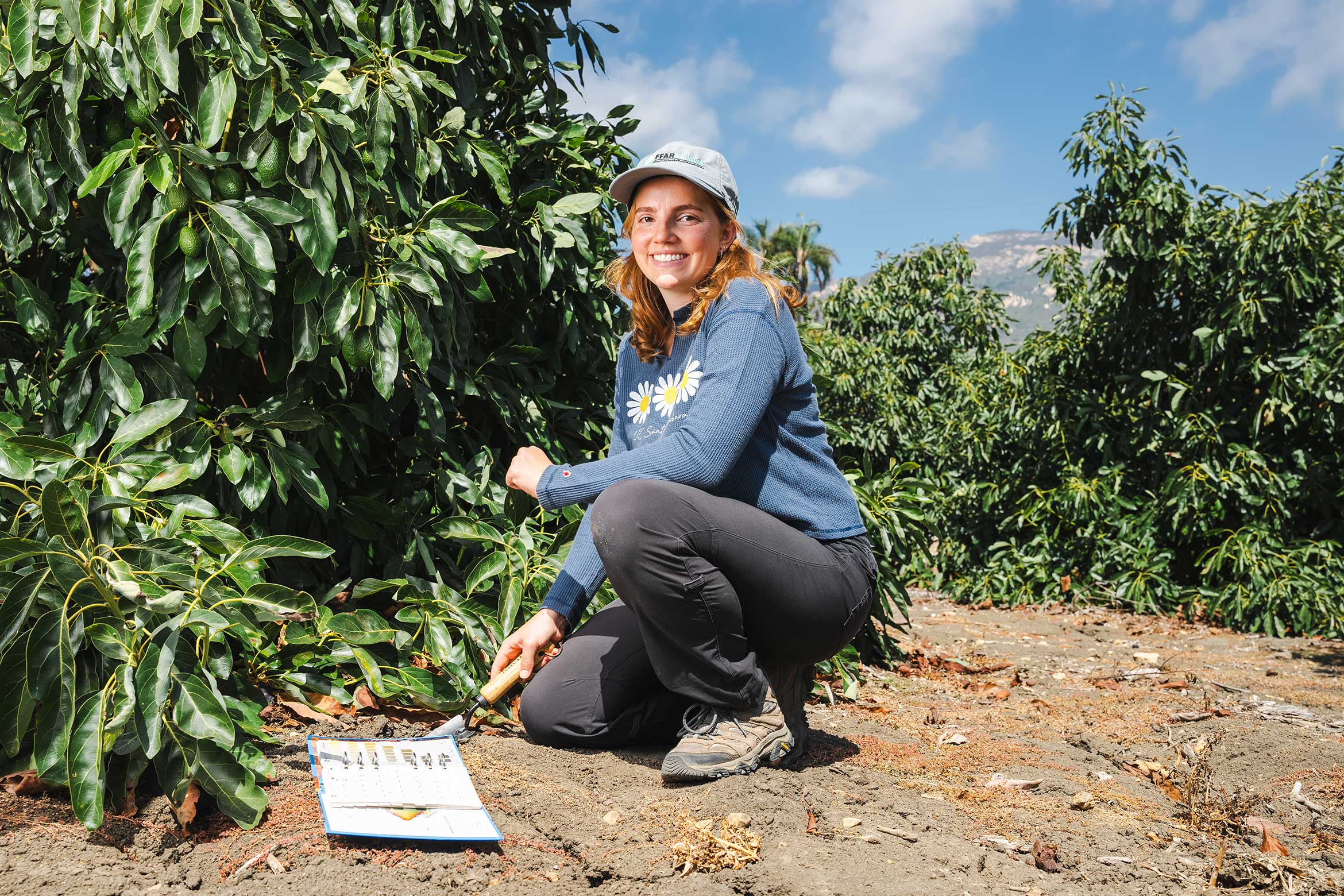
PHOTO BY JEFF LIANG

PHOTO BY JEFF LIANG
by Keith Hamm
Jesse Landesman has never been afraid of getting her hands dirty. As a schoolkid, she picked up trash and made mud pies during recess. Growing up, she was big on camping and hiking with her family. Fittingly today, she’s a soil scientist.
As a doctoral student in the Department of Geography, Landesman studies how elevated soil salinity takes its toll on avocados in California, home to 95% of the nation’s commercial harvest. The iconic nutrient-dense fruit is also among the top crops of Santa Barbara County’s $1.9 billion annual agricultural production. While research historically has focused on how salinity impacts the trees, Landesman is digging deeper, aiming her sampling tools and microscopes on soil chemistry and microbiology.
But for Landesman, it’s not all about number crunching in a lab coat. In its best form, she sees her work as interdisciplinary by nature, a Venn diagram centering connections between hard science, market forces and the boots-on-the-ground institutional knowledge of the growers themselves.
“I’m interested in the overlaps,” says Landesman, who earned her master’s degree at UCSB studying carbon sequestration in the restored wetlands of the North Campus Open Space. “A lot of academics like to ask their questions about more theoretical scientific concepts while farmers have different goals, like trying to figure out higher yields and less overhead. I think both of these worlds are important.”
To cultivate these connections, she was recently awarded a prestigious fellowship from the Foundation for Food & Agricultural Research (FFAR). Launched a decade ago, the FFAR helps scholars send down roots at the intersections of research, policy, industry and government via interpersonal training, professional development, mentorships and networking. Landesman is UCSB’s first FFAR fellow.
“We’re interested in supporting her interest in applicable science,” says program director Rebecca Dunning. “Looking at what’s going on in the ground and in the market and seeing how growers are dealing with a variety of challenges, from labor shortages to drought to farming equipment — that’s when her ability to communicate effectively becomes important.”
Landesman’s three-year fellowship is cosponsored by the California Avocado Commission, providing her an inside track to growers.
“There is so much research for the sake of research,” says Tim Spann, an agricultural consultant who serves on Landesman’s mentoring committee and is her main contact with the commission. “But as a scientist, when you’re having conversations within the ag industry, you understand that there’s a real connection to growers and the food supply and ultimately to the consumers.”
Much of her path, Landesman says, was revealed early on. Along with her younger brother and older sister, she was raised by adventurous parents, both school teachers, in the Altadena foothills of the San Gabriel Mountains. With summers off, the family set out on outdoors adventures all over the Western U.S. “This upbringing inspired me to study environmental science and management,” she remembers.
The interdisciplinary range of UCSB’s geography department, Landesman says, allows her the leeway to connect with growers and conduct the sort of research — both in the lab and in the field — applicable to real-world problems.
Looking ahead, she sees herself working to make technical science “more inclusive and universally understandable to students, farmers and policymakers,” she says. Along the way, she hopes to encourage other women to gain the confidence to pursue research and graduate education — “and to realize their potential as dirt-loving scientists.”